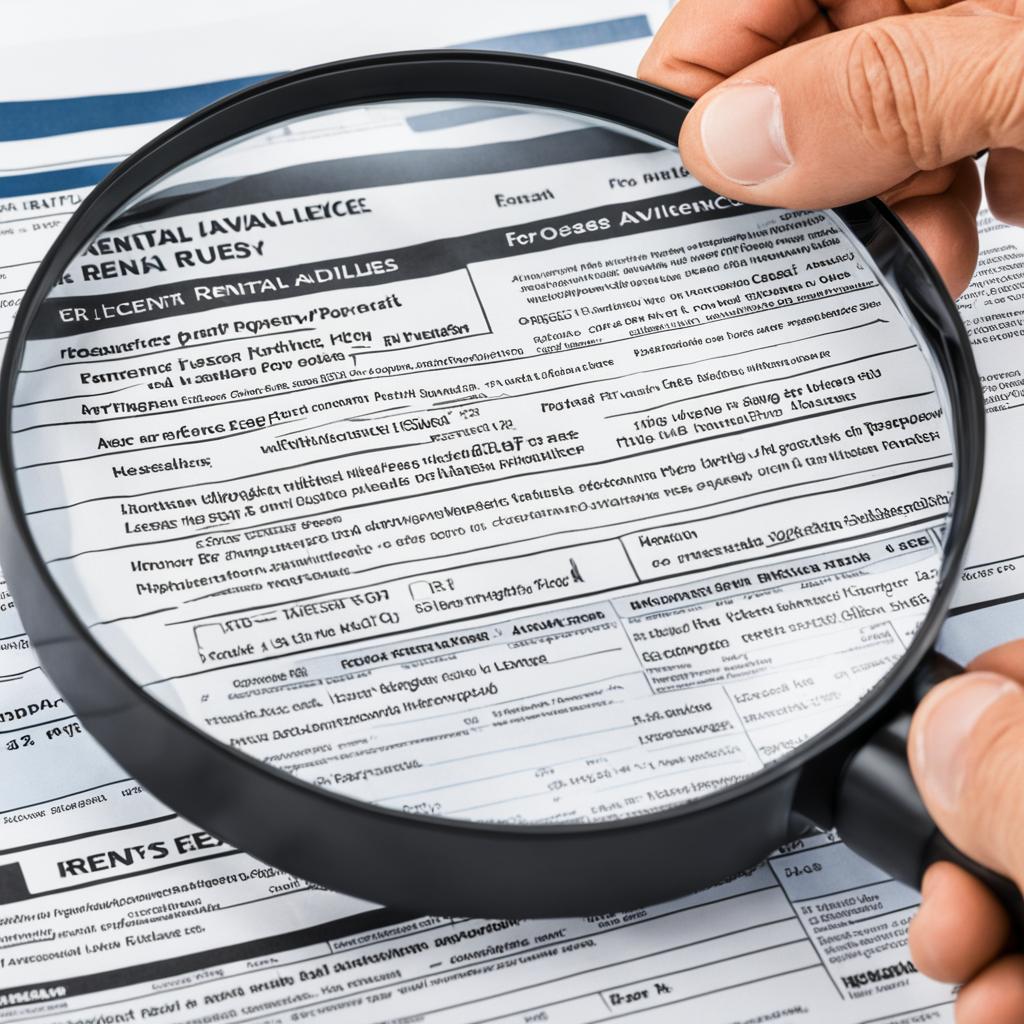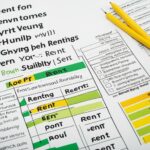Buying a rental property is a significant investment, and it is crucial to thoroughly evaluate the property before making a purchase. A rental property due diligence checklist helps ensure that you consider all the necessary factors and avoid potential problems. In this article, I will outline the key steps you should follow when conducting due diligence for a rental property.
Key Takeaways:
- Perform a value projection to determine if the property is undervalued or overpriced.
- Assess the location by considering factors such as the surrounding neighborhood, proximity to amenities, and rental demand.
- Ensure there is adequate parking to meet tenant demand.
- Conduct a thorough physical inspection to identify any structural problems or maintenance issues.
- Analyze HOA rules and review environmental issues.
Conducting thorough due diligence is essential to make informed decisions when investing in a rental property. By following a comprehensive checklist and considering all relevant factors, you can minimize risks, maximize returns, and ensure the long-term success of your investment. Remember to seek professional advice when necessary and always prioritize the financial feasibility and potential profitability of the property.
Run a Value Projection
Before purchasing a rental property, it is important to assess its value and potential profitability. This crucial step allows you to make an informed decision and understand the financial feasibility of the investment. To run an accurate value projection, consider consulting with a mortgage lender or real estate agent who can conduct a comprehensive rental property analysis.
An experienced professional can provide valuable insights into the rental property due diligence process and guide you through the necessary steps. They can assist in requesting a long-term valuation assessment, which will help determine if the property is undervalued or overpriced.
During the rental property analysis, factors such as current market trends, comparable property sales, rental rates, and potential expenses are taken into consideration. These insights allow you to gauge the property’s profitability and future cash flow.
Remember, a thorough rental property due diligence process includes assessing both the short-term and long-term viability of the investment. By considering these factors in your analysis, you can make an informed decision and ensure a successful rental property investment.
Example Value Projection Analysis:
| Annual Rental Income | $30,000 |
|---|---|
| Vacancy Rate | 10% |
| Gross Operating Income (GOI) | $27,000 |
| Operating Expenses | $12,000 |
| Net Operating Income (NOI) | $15,000 |
| Capitalization Rate (Cap Rate) | 8% |
The value projection in this example indicates that the rental property generates an annual net operating income of $15,000. By applying a capitalization rate of 8%, the estimated value of the property would be $187,500. This analysis helps you assess the property’s value and potential return on investment.
Note: The image above illustrates the process of rental property analysis.
Assess the Location
When evaluating a rental property, the location is a critical factor that can greatly impact its success. Consider the following key aspects to ensure you make an informed decision:
Evaluate the Surrounding Neighborhood
Take the time to research the neighborhood where the property is located. Look for signs of growth and development, such as new businesses or infrastructure projects. Additionally, consider the overall safety, cleanliness, and appeal of the neighborhood. A desirable neighborhood can attract high-quality tenants and increase the property’s long-term value.
Proximity to Amenities
Assess the property’s proximity to amenities that tenants may value, such as schools, parks, shopping centers, and public transportation. Convenient access to these amenities can make the property more appealing to potential tenants. Furthermore, it adds convenience and enhances the overall desirability of the location.
Rental Demand in the Area
Research the rental demand in the area to determine the market’s occupancy rates and average rental prices. A high demand for rentals suggests a healthy rental market, increasing the likelihood of finding reliable tenants and achieving profitable rental income. Consider consulting with local real estate agents or property management companies for insight into the rental market’s dynamics.
Check for Zoning Issues and Planned Developments
Evaluate the property’s zoning regulations and ensure it aligns with your investment goals. Zoning issues can limit the property’s usage or future development potential. Additionally, investigate any planned developments or infrastructure projects in the area that may impact the property’s value or rental potential over time.
By thoroughly assessing the location, you can determine if it aligns with your investment objectives and maximize the property’s profitability. Take the time to research the surrounding neighborhood, consider proximity to amenities, evaluate rental demand, and be aware of any zoning or development issues that may impact the property’s long-term value.
Make Sure There’s Adequate Parking
When it comes to rental properties, parking availability is a critical factor that can significantly impact both the rental value and tenant demand. As an investor, it is crucial to ensure that the property you are considering has sufficient parking spaces for your potential tenants.
Lack of parking can deter prospective tenants and limit the property’s rental income potential. Imagine yourself as a tenant: would you be willing to rent a property that doesn’t provide convenient parking options? Probably not.
As you evaluate rental properties, be sure to assess the parking situation. Consider the following:
- Are there dedicated parking spaces for each unit?
- If not, is there ample street parking available?
- Are there any restrictions on parking, such as time limits or permits?
Additionally, think about the location of the parking spaces. Are they conveniently located near the rental units, or will tenants have to walk a significant distance to access their vehicles?
Remember, parking availability is not only important for tenants’ convenience but also impacts the property’s overall desirability and potential rental income. Therefore, considering adequate parking in your rental property investment checklist is essential for long-term success.
Quote:
“Having sufficient parking spaces is a non-negotiable requirement for many renters. Ensure that your property checks this box to attract and retain quality tenants.” – John Mitchell, Real Estate Investor
Conduct a Thorough Physical Inspection
A comprehensive physical inspection is an essential part of the rental property due diligence process. It allows me to identify any hidden issues that may affect the property’s condition and profitability. To conduct a thorough inspection, it is advisable to hire a professional inspector who specializes in property assessments. They will have the expertise and tools to thoroughly evaluate the property’s structural integrity, safety features, and maintenance requirements.
During the inspection, the following areas should be carefully examined:
1. Structural Integrity
An inspector will evaluate the foundation, walls, and roof for any signs of damage, such as cracks, leaks, or sagging. They will also assess the quality of construction to ensure the property meets safety standards.
2. Electrical System
The electrical system should be inspected to identify any outdated or faulty wiring, overloaded circuits, or safety hazards. It is crucial to confirm that the property has a sufficient electrical capacity to meet the needs of tenants.
3. HVAC (Heating, Ventilation, and Air Conditioning)
The heating and cooling systems should be inspected to ensure they are functioning properly and efficiently. The inspector will check for any maintenance needs, potential issues, or outdated equipment.
4. Plumbing
The inspector will evaluate the plumbing system for leaks, water pressure, and drainage problems. They will also check the condition of fixtures, pipes, and water heaters.
5. Safety Features
A thorough inspection includes assessing the property’s safety features, such as smoke detectors, carbon monoxide detectors, fire extinguishers, and emergency exits.
6. Pest Infestations
Inspectors will look for any signs of pest infestations, such as termites, rodents, or insects. A thorough examination will help identify any existing or potential pest problems that can impact the property’s habitability and value.
After the inspection, the inspector will provide a detailed report outlining their findings, including any recommended repairs or maintenance. This information is invaluable in estimating the potential maintenance and repair costs associated with the property.
A comprehensive property inspection is a critical step in the due diligence process. It helps me uncover potential hidden issues, estimate repair costs, and make an informed decision about the property’s overall condition and suitability for investment.
Analyze HOA Rules
When considering a rental property, it is crucial to analyze the rules and regulations of the homeowners association (HOA) if the property is part of one. Understanding the HOA’s guidelines will help you determine if there are any restrictions on renting or leasing the property, as well as any limitations that may affect its rental potential.
Start by reviewing the HOA’s governing documents, including the bylaws and covenants, conditions, and restrictions (CC&R). These documents outline the rules that property owners must abide by and provide insights into any rental restrictions or limitations. Look for any requirements regarding the minimum lease term, the number of guests allowed, or specific rental policies that may affect your ability to rent out the property.
Additionally, it is important to review the HOA’s financial statements to ensure its financial stability. A financially healthy HOA will have sufficient reserves to address maintenance and repair needs, reducing the risk of unexpected assessments for property owners.

Remember, failing to comply with the HOA rules and regulations can result in penalties or legal actions. Therefore, it is essential to thoroughly analyze the HOA rules as part of your rental property due diligence process.
To help you better understand the HOA rules and the impact they may have on your rental property, consider the table below:
| Key Considerations | Implications |
|---|---|
| Rental Restrictions | Restrictions on leasing the property, such as minimum lease terms or limitations on the number of rental units permitted. |
| Guest Policies | Regulations on the number of guests allowed, duration of guest stays, or any additional charges or requirements for guests. |
| Renovation Approvals | Process for obtaining approval from the HOA board for property renovations or modifications. |
| Amenities Usage | Specific guidelines for using shared amenities such as swimming pools, fitness centers, or community spaces. |
| Architectural Controls | Requirements for maintaining the property’s exterior appearance, landscaping, or any restrictions on exterior changes. |
| Assessment Fees | Details on the HOA assessment fees, how they are calculated, and any potential future increases. |
By carefully analyzing the HOA rules and regulations, you can assess whether the property aligns with your investment goals and avoid any surprises or conflicts in the future.
Review Environmental Issues
When investing in a rental property, it’s important to consider the impact of environmental factors on the property’s value and potential risks. Conducting thorough due diligence in this area is essential for long-term success.
One crucial aspect of environmental due diligence is the assessment of potential hazards within the property itself. Consider conducting environmental tests to identify any issues such as mold, asbestos, termites, or other contaminants that may pose risks to the property and its occupants.
Additionally, it’s important to research the area surrounding the property for any environmental risks that may affect its value in the long term. This may include checking for potential flood zones, wildfire-prone areas, or contamination risks from nearby industries.
By thoroughly evaluating the environmental aspects of a rental property, you can make informed decisions and mitigate any potential liabilities. This not only protects your investment but also ensures the safety and well-being of your tenants.
Environmental Due Diligence Checklist
| Environmental Factor | Checklist |
|---|---|
| Indoor Hazards |
|
| Outdoor Hazards |
|
Remember, thorough due diligence is crucial for rental property investments. Environmental issues can significantly impact the property’s value and potential risks. Take the necessary steps to assess both indoor and outdoor hazards, ensuring the safety and profitability of your investment.
Collect Repair Estimates
When performing due diligence on a rental property, it’s vital to assess the costs associated with maintenance and repairs. To obtain an accurate estimate, I recommend collecting repair estimates from trusted contractors. These professionals have the expertise to evaluate the extent of repairs required and provide insights into the associated costs.
By gathering repair estimates, you will gain a better understanding of the potential expenses associated with the property. These estimates will help you create a comprehensive budget and determine the property’s profitability. Additionally, having this information at hand allows you to negotiate effectively with the seller and make an informed decision about your investment.
Why Collect Repair Estimates?
Collecting repair estimates serves several purposes:
- Accurate Budgeting: Repair estimates help you budget effectively by providing realistic cost projections for necessary repairs.
- Negotiation Tool: Armed with repair estimates, you have leverage during negotiations with the seller to address any significant repair issues.
- Financial Planning: Having an understanding of repair costs allows you to plan for future expenses and determine the property’s profitability.
To ensure the accuracy of your repair estimates, it is important to:
- Obtain multiple estimates from different contractors. This helps you compare costs and ensure you are getting a fair price.
- Ask for detailed breakdowns of the estimated costs, including labor, materials, and any additional charges.
- Verify the qualifications and reputation of the contractors providing the estimates. Look for reviews, licenses, and certifications.
Remember, accurate repair estimates are a crucial part of your due diligence process. They provide valuable information that helps you make informed decisions and avoid unexpected expenses down the line.
Collecting Repair Estimates Table:
| Contractor | Repair Category (e.g., Electrical, Roofing, Plumbing) | Repair Description | Estimated Cost ($) |
|---|---|---|---|
| ABC Construction | Roofing | Replace damaged shingles and repair roof leaks | 2,500 |
| XYZ Plumbing | Plumbing | Replace faulty water heater and repair leaking pipes | 1,800 |
| DEF Electrical | Electrical | Upgrade electrical panel and replace outdated wiring | 3,000 |
By collecting repair estimates and maintaining a comprehensive record, you can confidently evaluate the potential costs and make informed decisions regarding the rental property’s profitability and maintenance needs.

Conduct a Property Appraisal
Before finalizing the purchase of a rental property, it is crucial to conduct a property appraisal. Seeking the services of a certified appraiser will provide an independent valuation of the property, confirming its market value and ensuring a fair purchase price. As part of the rental property analysis, the appraisal results should be considered alongside other due diligence factors to make a well-informed investment decision.
“A property appraisal is a critical step in evaluating a rental property’s worth. By obtaining an expert evaluation, you’ll have a clear understanding of its value and negotiate confidently.” – John Smith, Real Estate Investor
Determining the Market Value
The property appraisal will determine the fair market value of the rental property. This valuation takes into account various factors such as the property’s location, size, condition, and comparables in the local market. Understanding the market value helps ensure that you are not overpaying for the property and aligns with your investment goals.
Consideration of Other Due Diligence Factors
While the property appraisal provides valuable insight into the market value, it should be considered alongside other due diligence factors. These factors may include rental income potential, repair costs, property management considerations, and anticipated cash flow. By evaluating the appraisal results in conjunction with these factors, you can make a comprehensive analysis of the rental property’s potential ROI.
| Benefits of Property Appraisal | Considerations in Property Appraisal |
|---|---|
|
|
By conducting a property appraisal, you can confidently assess the market value of a rental property and make an informed investment decision. Remember to consider the appraisal results alongside other due diligence factors to gain a comprehensive understanding of the property’s potential as a profitable rental investment.
Expand Your Search
When it comes to investing in a rental property, it’s important to cast a wide net. Don’t limit yourself to just one property; instead, expand your search and consider multiple options. By exploring different neighborhoods, property types, and price ranges, you can increase your chances of finding the ideal investment opportunity that aligns with your goals.
Expanding your search allows you to gather a wealth of information and compare various properties. You’ll gain valuable insights into rental demand, property values, and potential profitability. This comprehensive approach ensures that you make an informed decision and choose the best fit for your investment strategy.
Exploring Different Neighborhoods
Each neighborhood has its own unique characteristics and offers different advantages for rental property investments. Take the time to research and explore various neighborhoods in your target area. Consider factors such as proximity to amenities, schools, transportation options, and safety. By considering multiple neighborhoods, you can discover hidden gems and uncover emerging areas with high growth potential.
Diversifying Property Types
Don’t limit yourself to a specific property type. Explore different options such as single-family homes, multi-unit buildings, townhouses, or condominiums. Each property type has its own advantages and considerations. Diversifying your portfolio by investing in different property types can help mitigate risks and increase your potential returns.
Considering Price Ranges
While it’s essential to have a budget in mind, don’t be afraid to consider properties outside your initial price range. Sometimes, properties priced slightly higher or lower than your target range can offer better value or greater potential for appreciation. By considering a range of prices, you can find properties that offer the best balance between affordability and investment potential.
Expanding your search is a key step in the rental property evaluation checklist. By exploring different neighborhoods, property types, and price ranges, you can make a well-informed decision and increase your chances of finding a lucrative investment opportunity. Remember, the perfect property might be just around the corner – you just have to widen your search to find it.

Consult with a Financial Advisor
When it comes to investing in a rental property, seeking guidance from a financial advisor is a wise decision. A financial advisor can provide invaluable expertise and support throughout the due diligence process. They can help you evaluate your overall investment portfolio and determine the financial feasibility of the rental property investment. By assessing your goals, risk tolerance, and financial situation, they can offer personalized recommendations that align with your objectives.
An experienced financial advisor will analyze key factors such as rental income potential, property appreciation prospects, and financing options, ensuring you make an informed investment decision. They can also help you assess the tax implications, insurance requirements, and potential future market trends that may impact your investment. Their expertise will empower you to make strategic decisions that minimize risk and maximize the returns on your rental property investment.
Why Consult with a Financial Advisor?
Consulting with a financial advisor brings a multitude of benefits when investing in rental properties:
- Expert Insights: A financial advisor specializes in investment strategies and can provide expert insights into the rental property market. They stay up to date with industry trends, local market conditions, and regulatory changes that may impact your investment.
- Objective Analysis: Financial advisors offer an outside perspective and unbiased analysis of your investment options. They consider your financial goals, risk tolerance, and time horizon to provide an objective evaluation of the rental property’s potential as part of your overall investment strategy.
- Risk Management: The rental property market comes with inherent risks, such as tenant turnover, property damage, and economic fluctuations. A financial advisor can help you assess and mitigate these risks through effective diversification strategies and contingency plans.
- Industry Network: Financial advisors often have extensive networks within the real estate industry. They can connect you with trusted professionals, such as mortgage lenders, property managers, and inspectors, who play essential roles in the due diligence process.
To illustrate the importance of consulting with a financial advisor, let’s take a look at a comprehensive comparison of rental property investment options:
| Investment Options | Risks | Return Potential | Liquidity |
|---|---|---|---|
| Rental Property | Market volatility, property damage, tenant vacancies | Potential for rental income and property appreciation | Relatively illiquid |
| Stock Market | Market volatility, company-specific risks | Potential for capital gains/dividends | High liquidity |
| Bonds | Interest rate risk, credit risk | Steady interest income | High liquidity |
| Mutual Funds | Market risk, fund management risk | Varies based on fund composition | High liquidity |
Note: The table above is for illustrative purposes only and does not constitute financial advice.
As shown in the table, each investment option presents different levels of risk, return potential, and liquidity. A financial advisor can help you thoroughly analyze these factors and guide you in determining the rental property’s suitability within your investment portfolio.
By collaborating with a financial advisor throughout the rental property due diligence process, you can make well-informed decisions that align with your financial goals and risk tolerance. Their expertise will provide you with the confidence and support you need to maximize the returns on your rental property investment.
Ask for a Title Examination
A title examination is a crucial part of the rental property due diligence process as it ensures that the property’s ownership is clear and free from any encumbrances. Engage a lawyer or a title company to perform a comprehensive title search and review all relevant documents, such as liens, easements, and any potential issues that may affect your ownership rights.
Why is a Title Examination Important?
When investing in a rental property, it is essential to verify the property’s title to ensure that you will have clear ownership rights without any legal obstacles. Conducting a title examination helps safeguard your investment by identifying any outstanding liens, claims, or encumbrances that may exist against the property.
By engaging a lawyer or a title company, you can benefit from their expertise in conducting thorough searches and reviewing the property’s title history. They will assess any potential issues and provide you with a detailed report outlining the property’s ownership status.
The Process of a Title Examination
To obtain a comprehensive understanding of the property’s title, a title examination typically involves the following steps:
- Gathering Information: Your chosen lawyer or title company will acquire all the necessary documents related to the property, including the deed, mortgage information, tax records, and any other relevant legal documents.
- Title Search: A thorough search of public records will be conducted to trace the property’s ownership history. This search helps identify any liens, judgments, or other encumbrances that may affect the property’s title.
- Reviewing Documents: The lawyer or title company will carefully review the gathered documents to assess the validity of the property’s title and identify any potential issues that need further investigation.
- Resolving Issues: If any problems or discrepancies are discovered during the examination, the lawyer or title company will work to resolve them, ensuring that the property’s title is clear and marketable.
- Title Insurance: It is advisable to obtain title insurance to protect your investment from any unforeseen issues that may arise in the future. Title insurance provides financial coverage in case of any undisclosed title defects or claims against the property.
Benefits of a Clear Title
A clear title is essential for several reasons:
- Ownership Security: A clear title ensures that you are the rightful owner of the property and have the legal right to sell, lease, or transfer the property without any restrictions or disputes.
- Financial Security: A clear title gives you peace of mind that there are no outstanding liens or unpaid debts associated with the property, preventing unforeseen financial obligations.
- Marketability: A clear title increases the marketability of the property, making it more attractive to potential buyers or lenders in the future.
Request an Insurance Claim Report
When considering an investment in a rental property, it is important to gather as much information as possible about the property’s history, including its insurance claims. Requesting an insurance claim report from the seller’s insurance provider can provide valuable insight into the property’s insurance history and help you assess its risk profile.
The insurance claim report will disclose any previous claims or damages that the property has experienced. This information is crucial in understanding the property’s potential for future insurance claims and the associated costs. By reviewing the report, you can evaluate the property’s risk profile and make an informed decision about its suitability for investment.
An insurance claim report can reveal several important details that could impact your decision-making process. It may highlight any major incidents, such as storm damage, fire, or water leaks, that have occurred in the past. By having this information, you can assess how these incidents were addressed and determine if there may be any lingering issues that require further attention or maintenance.
Additionally, the insurance claim report can provide insight into the property’s overall risk profile. If the property has a history of frequent or large insurance claims, it may indicate potential ongoing maintenance issues or environmental risks. On the other hand, a clean claims history can provide reassurance that the property has been well-maintained and is less likely to present any unforeseen expenses in the future.
Requesting an insurance claim report is an essential step in rental property investment due diligence. It helps you understand the property’s insurance history, assess its risk profile, and make an informed decision about whether it aligns with your investment goals and risk tolerance.
| Benefits of Requesting an Insurance Claim Report | Considerations |
|---|---|
| Provides insight into the property’s insurance history | Review the types and frequency of past claims |
| Helps assess the property’s risk profile | Consider the potential for future insurance claims |
| Identifies major incidents and their resolution | Evaluate any lingering issues or maintenance needs |
| Offers reassurance with a clean claims history | Verify the property’s overall condition and maintenance |

Why You Should Request an Insurance Claim Report
“Requesting an insurance claim report provides valuable insights into the property’s insurance history and risk profile, helping you make informed decisions about your rental property investment.”
By thoroughly evaluating the property’s insurance claim history, you can gain a comprehensive understanding of its past incidents, potential risks, and ongoing maintenance needs. Armed with this knowledge, you can confidently move forward with your rental property investment, knowing that you have conducted proper due diligence.
Review Your Property Rights
When you’re nearing the final stages of purchasing a rental property, it’s crucial to review the seller’s disclosures to gain a clear understanding of the property’s condition and any known issues. This step is essential in protecting your property rights and ensuring you’re prepared for potential liabilities that may arise after the purchase.
Consider consulting with a real estate agent or attorney who specializes in rental property transactions. They have the expertise to assist you in reviewing these documents and can provide valuable insights and guidance.
Why Reviewing Property Rights is Important
Reviewing the seller’s disclosures is an integral part of due diligence in rental property investments. It allows you to:
- Understand the property’s history, including any previous disputes or legal issues
- Identify any restrictions or encumbrances that may affect your ability to rent or make changes to the property
- Evaluate potential liabilities related to the property, such as ongoing maintenance obligations or pending lawsuits
Consulting with Professionals
Working with a real estate agent or attorney who specializes in rental property transactions can provide invaluable support during the review process. They can help you:
- Interpret complex legal language and jargon
- Identify potential red flags or areas of concern
- Negotiate any necessary repairs, credits, or contingencies based on the information revealed in the disclosures
In summary, carefully reviewing your property rights through the seller’s disclosures is a critical step in the rental property due diligence process. It ensures that you are fully informed about the property’s condition and any potential risks or liabilities before finalizing the purchase. Seek guidance from professionals to navigate this process effectively and protect your investment.
Conclusion
Conducting thorough due diligence is crucial when investing in a rental property. By following a comprehensive checklist and considering all relevant factors, you can minimize risks, maximize returns, and ensure the long-term success of your investment.
During the rental property due diligence process, it is essential to evaluate the property’s value projection, assess the location and parking availability, conduct a physical inspection, analyze HOA rules, and review any potential environmental issues. Additionally, collecting repair estimates, conducting a property appraisal, expanding your search, consulting with a financial advisor, and requesting a title examination and insurance claim report are vital steps to make informed decisions.
Remember that rental property analysis involves more than just a financial assessment. It requires evaluating the property’s condition, location, and market demand to determine its potential profitability. Seek professional advice when needed and prioritize the financial feasibility and potential return on investment to ensure the success of your rental property venture.
FAQ
What is a rental property due diligence checklist?
A rental property due diligence checklist is a tool that helps investors thoroughly evaluate a property before making a purchase. It outlines the key steps to follow when conducting due diligence to ensure all necessary factors are considered and potential problems are identified.
Why is it important to assess the value and potential profitability of a rental property?
Assessing the value and potential profitability of a rental property is crucial to make an informed investment decision. It helps determine if the property is undervalued or overpriced, allowing investors to understand its financial feasibility and potential returns.
How does location impact the success of a rental property?
The location of a rental property plays a significant role in its success. Factors such as the surrounding neighborhood, proximity to amenities, and rental demand in the area can impact its value and tenant demand. It is important to assess these external factors during due diligence.
Why is parking availability important when investing in a rental property?
Parking availability can significantly impact the rental value and tenant demand for a property. It is important to ensure that the property has sufficient parking spaces for tenants. Lack of parking can deter potential tenants and affect the property’s rental income potential.
Why is a thorough physical inspection necessary when assessing a rental property?
A comprehensive physical inspection is crucial to identify any structural problems, safety hazards, or maintenance issues in a rental property. Hiring a professional inspector helps assess the property’s condition, including electrical systems, HVAC, plumbing, and structural integrity, which helps estimate potential maintenance and repair costs.
How does analyzing HOA rules affect a rental property investment?
If a rental property is part of a homeowners association (HOA), it is essential to review the HOA rules and regulations. These rules may impose restrictions on renting or leasing the property, limit the number of guests allowed, or have other limitations that may affect its rental potential. Reviewing the HOA’s financial statements also ensures financial stability.
Why is it important to review environmental issues when investing in a rental property?
Environmental factors can significantly impact a rental property’s value and potential risks. Conducting environmental tests for hazards such as mold, asbestos, termites, and researching the area for environmental risks like floods or contamination helps assess long-term value and potential liabilities.
How do repair estimates help in due diligence for rental property investment?
Collecting repair estimates from trusted contractors helps assess the costs associated with a rental property’s maintenance and repairs. Professional opinions on the extent of repairs needed and associated costs help budget for potential expenses and determine the property’s profitability.
Why is a property appraisal necessary when buying a rental property?
Obtaining a property appraisal from a certified appraiser confirms the property’s market value and ensures a fair price. It is important to consider the appraisal results in conjunction with other due diligence factors to make an informed investment decision.
Why is it advisable to expand your search and consider multiple properties?
Expanding your search and considering multiple properties increases the chances of finding the ideal investment opportunity. Exploring different neighborhoods, property types, and price ranges allows investors to find the best fit for their investment goals.
Why is it important to seek guidance from a financial advisor when investing in rental properties?
Seeking guidance from a financial advisor helps assess the overall investment portfolio, determine the financial feasibility of a rental property investment, and receive recommendations to minimize risks and maximize returns.
What is the significance of a title examination in due diligence for rental property investment?
A title examination ensures that the property’s ownership is clear and free from any encumbrances. Engaging a lawyer or a title company to perform a comprehensive title search and review relevant documents such as liens and easements helps assess ownership rights and avoid potential issues.
Why should I request an insurance claim report when buying a rental property?
Requesting an insurance claim report from the seller’s insurance provider provides valuable insight into the property’s insurance history. It discloses any previous claims or damages, allowing buyers to assess the property’s risk profile and make an informed investment decision.
Why is it important to review property rights before finalizing the purchase?
Reviewing the seller’s disclosures regarding the property’s condition and any known issues is crucial. It helps buyers have a clear understanding of their property rights and potential liabilities that may arise after the purchase. Consulting with a real estate agent or attorney can provide assistance in reviewing these documents.
Why is thorough due diligence essential for rental property investment?
Conducting thorough due diligence helps investors make informed decisions when investing in rental properties. By following a comprehensive checklist and considering all relevant factors, they can minimize risks, maximize returns, and ensure the long-term success of their investments. Seeking professional advice is necessary, and prioritizing the property’s financial feasibility and potential profitability is important.
Our Friends
- https://millennialmoney.com/rental-property-due-diligence-checklist/
- https://www.dealpath.com/blog/real-estate-due-diligence-checklist/
- https://www.biggerpockets.com/blog/due-diligence-ultimate-guide
Money posts:
 Types of Life Insurance Policies Explained (2024)
Types of Life Insurance Policies Explained (2024)
 Rideshare Insurance: What It Is & Your Best Options (2024)
Rideshare Insurance: What It Is & Your Best Options (2024)
 Turo Review in 2024: Can You Actually Make Money with Turo Car Sharing?
Turo Review in 2024: Can You Actually Make Money with Turo Car Sharing?
 Turo Review | Make Money Renting Out Your Car (2024)
Turo Review | Make Money Renting Out Your Car (2024)
 Rent or Buy? How I Made $350,000 in 4 Years
Rent or Buy? How I Made $350,000 in 4 Years
 Time Value of Money Examples (2024)
Time Value of Money Examples (2024)
 What’s the Difference Between Financial Freedom and Financial Independence in 2024?
What’s the Difference Between Financial Freedom and Financial Independence in 2024?
 What Are the Different Types of Financial Advisors? (2024)
What Are the Different Types of Financial Advisors? (2024)

